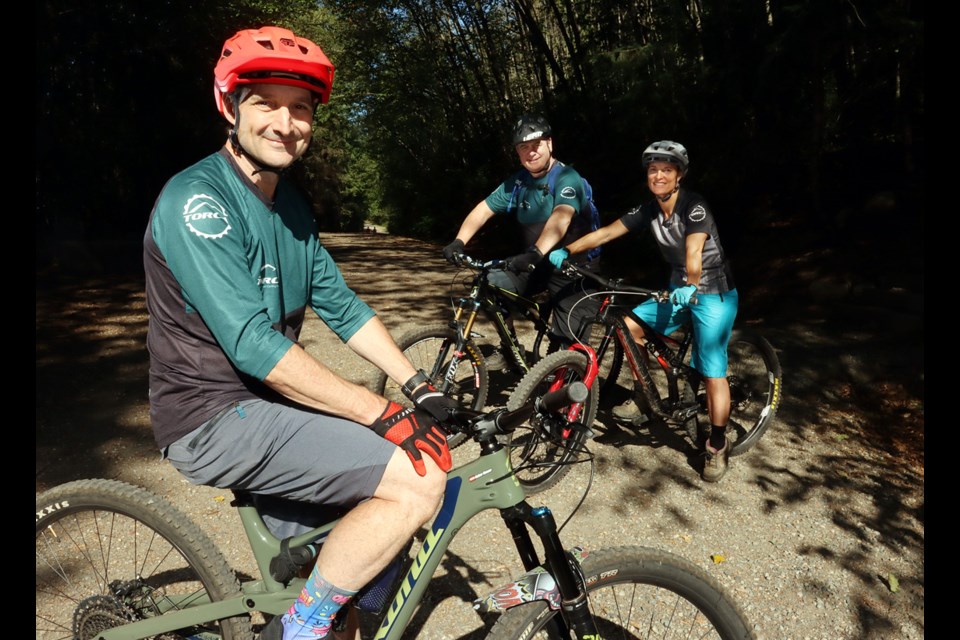The COVID-19 cycling boom that’s depleted inventory at local bike shops and causes you to have to give up your ride for up to a month when it needs service or a tune-up is having an impact on local trails.
That’s increasing pressure on local groups like the Tri-Cities Off Road Cycling Association (TORCA) to educate newcomers to the sport about trail etiquette and recruit veterans to maintain routes.
Director Karaleen Gioia says data compiled from Trail Forks, an online app where riders and hikers can plot routes and log their efforts, show “a huge increase” in users accessing the 23 km of sanctioned trails on Eagle and Burke mountains in Coquitlam, where ridership is up almost 35 per cent and in Port Moody’s Bert Flinn Park, where use has gone up four fold over pre-pandemic levels.
All those additional tires and soles of hiking boots have the potential to erode existing trails, trample vegetation, even knock sediment into fish-bearing waterways.
“It’s a constant process to get users more educated,” Gioia said.
TORCA was founded in 1998 as the Tri-Cities Off Road Cycling Coalition to help foster a peaceful coexistence between outdoor enthusiasts looking to access and enhance the existing network of unofficial trails on local mountains and forested areas and property owners and developers.
Over the years, that included a slight name change as TORCC became a registered non-profit society, the group has become an advocate for trail access in the Tri-Cities, forging relationships with municipal and provincial stakeholders, organizing volunteers to build and maintain trails and hosting community events to build awareness and grow mountain biking.
While public health restrictions have curtailed TORCA’s ability to hold organized events like races and trail days, director Gabor Huszar said membership has more than doubled to above 600 since 2019. Their fees, as well as funds raised through initiatives like raffles and grants from an environmental stewardship program offered by TD bank, have helped pay for contract workers to take on some of the trail work that is usually done by volunteers, keeping them ridable and minimizing the sport’s impact on its environs.
Still, said Gioia, educating riders and hikers about their responsibilities on the trails is a huge component of TORCA’s work.
“When people see how much work goes into a trail, there’s a greater willingness to be respectful,” she said.
Often, that work is invisible to users, like the foundation of heavy rocks and stones underneath some sections of trail, the use of natural materials from the forest floor to create structures or bolster berms, or the subtle placement of a route to prevent dirt and dust from sliding into a nearby stream.
The group is also working to boost its educational efforts in more apparent ways like increased signage along trails to help alert users of each other’s presence, remind users to stay on designated tracks, or just ask them to stay off trails altogether when they might be saturated by rain.
“Signage is huge,” Gioia said. “It deals with the person in that place at that moment.”
The group is also working with the cities to place kiosks at trailheads. They’ll be marked with QR codes that users can scan with their mobile phones for information about the trails, hazards they should be aware of, and challenges they might encounter.
Gioia said all such efforts ensure the trail network remains sustainable and can absorb the increasing numbers of users while minimizing conflicts.
But, added Huszar, “We still have lots of work to do.”
TORCA is currently running a raffle to raise money for its efforts as well as an initiative started by an advocacy group called Colour the Trails that promotes inclusivity in the sport. First prize is a limited edition bike by Burnaby’s Knolly Bikes that’s worth about $10,000.
The draw will be held Oct. 17.
To find out more about TORCA, as well as a link to the raffle, go to www.torca.ca.



